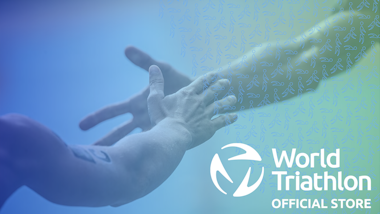Paratriathlon World Series underway in Yokohama
16 May, 2014 | español
Paratriathlon has its own elite racing in Yokohama on Saturday morning, before the ITU elites take to the course and the fields are both large and deep with talent.
Great Britain is foremost amongst the nations represented in Yokohama, sending a 14-strong team plus support staff as they pursue vital world ranking points and international experience. This is with upcoming continental championships and longer term with sport’s debut at the Rio 2016 Paralympic Games in mind.
Jonathon Riall is the Paratriathlon Performance Manager for British Triathlon.
Four-time Paratriathlon World Champion Faye McClelland.
“I had always done able bodied sport, I had never taken part in disability sport. I guess for me it was a way of acknowledging my disability, because it has been such a minor issue to me I have always passed myself off as able bodied when in actual fact, I am not. So for me it was a bit of a realization and a bit of self-acceptance really to get involved. Growing up I just wanted to fit in with the other kids, during my younger childhood I was quite shy about it so in a way, Paratriathlon has helped me accept it.”
“What it has also done though is made me aware of the elite athletes that are competing in Paratriathlon. We have many Paratriathletes from elite single sport backgrounds of swimming, cycling or running. It is quite scary for me as I never envisaged myself competing at this level, in this company. I admire them all so much. The range of disability is so wide but they are all amazing in their dedication, their training and their athletic ability, they are all just real sportspeople, regardless.”
“We have our top 14 athletes here in Japan, all who competed at world champs as the end of 2013. This being the first race within the new Paratriathlon World Series and working for us from a calendar point of view dictated that we send a strong team to Yokohama,” Riall said. “It is about 38 days out from our continental champs so the points we earn here will help our athletes gain entry into those races. With the world series just beginning all the athletes are on scratch, we imagine in a year’s time it will be strategically different but for now this is the race to get our team going forward for the European champs.”
“While we don’t earn points towards Rio in Yokohama as our qualification programme for the Paralympics is on a one year cycle starting next July, there is a knock on effect that are that as we approach that qualifying period next year we want our athletes understanding the process and are in a decent place.”
Amongst that strong British team in Yokohama is four-time world champion Faye McClelland. One of the most successful paratriathletes in Britain, McClelland won her first ITU World Championship in Budapest in 2010 and has been almost unbeatable since then.
“This is a big commitment, it is a long way to come and most of us are still working and juggling family life and other things. It also shows how serious we are about what we are doing, the new points system comes in this year and we all want to be atop of our game and qualifying for the European Championships. This is a key race to earn those points and take us forward into the season.
“I have been doing triathlon for a number of years but I have been involved in Paratriathlon since 2009 after taking a couple of years out of the sport at recreational level. I was a fitness instructor and have always been fairly fit and did a variety of sports growing up. But I got hooked on triathlon and here I am now.”
Triathlon is difficult enough as it is with the three disciplines and training regime required to reach the top, what then drives the likes of 34-year-old McClelland to the sport?
“I guess I have always liked a challenge. Growing up I tried a lot of sports and while I wouldn’t say I was overly competitive, I was very outgoing and have always loved the outdoors and can get bored trying one thing for too long so triathlon was a great and natural fit for me with its variation.
“I am in Tri4, the arm impairment class. I was born without my left hand which I guess puts me in the upper limb amputee bracket – there are so many variations and we all have something slightly different – for some it can be a paralysis, for others like me they are without a limb. For me I was born this way and I didn’t know anything different you just adapt as you grow up and don’t give it a second thought, it is just part of who you are.”
McClelland took most of last year out to finish her degree in physiotherapy but is back with an eye to the future and continuing her success.
“My aim is to carry on winning World Championships, to retain my title this year and to keep on improving in myself. The ultimate goal is a place in Rio - that would be the pinnacle at the Rio Paralympics.”
Amongst the stars lining up in field of over 60 athletes in the five sport class events in the Paratriathlon at Yokohama tomorrow (Saturday) are, three-time TRI-2 World Champion Stephane Bahier (FRA), four-time TRI-4 World Champion Yannick Bourseaux (FRA), and TRI-6B 2012 World Champion Susana Rodriquez (ESP), as well as the British team that includes Dave Ellis, Chris Goodwin, Jane Egan, McClelland and Melissa Reid.
Yokohama is the first Paratriathlon event that will operate under the new system of five sport classes.
For more information on Paratriathlon, please click here.
The Paratriathlon Sport Classes are as follows:
PT1 - Wheelchair users. Includes athletes with comparable activity limitation and an impairment of, but not limited to: muscle power, limb deficiency, hypertonia, ataxia, athetosis that prevent the ability to safely ride a conventional bike and run. Through classification assessment, athletes must have a score of up to 640,0 points. Athletes must use a recumbent handcycle on the bike course and a racing wheelchair on the run segment;
PT2 - Includes athletes with comparable activity limitation and an impairment of, but not limited to, limb deficiency, hypertonia, ataxia and or athetosis, impaired muscle power or range of movement that through classification assessment have a score of up to 454,9 points. In both bike and run segments, amputee athletes may use approved prosthesis or other supportive devices.
PT3 - Includes athletes with comparable activity limitation and an impairment of, but not limited to, limb deficiency, hypertonia, ataxia and or athetosis, impaired muscle power or range of movement that through classification assessment have a score from 455,0 to 494,9 points. In both bike and run segments, the athlete may use approved prosthesis or other supportive devices.
PT4 – Includes athletes with comparable activity limitation and an impairment of, but not limited to, limb deficiency, hypertonia, ataxia and or athetosis, impaired muscle power or range of movement that through classification assessment have a score from 495,0 to 557,0 points included. In both bike and run segments, the athlete may use approved prosthesis or other supportive devices.
PT5 - Total or Partial visual Impairment (IBSA/IPC defined sub-classes B1, B2, and B3): Includes athletes who are totally blind, from no light perception in either eye, to some light perception but unable to recognize the shape of a hand at any distance or in any direction (B1) and partially sighted athletes with a visual acuity of less than 6/60 vision or visual field less than 20 degrees with best corrective vision (B2-B3). One guide is mandatory throughout the race. Must ride a tandem during the bike segment.





